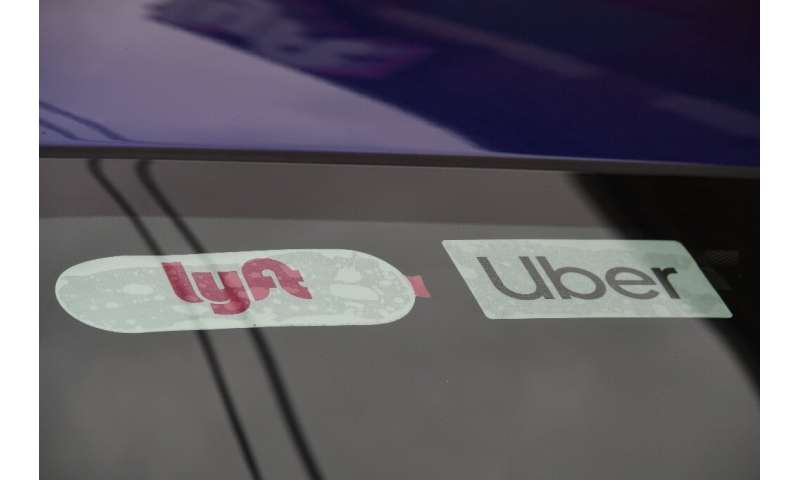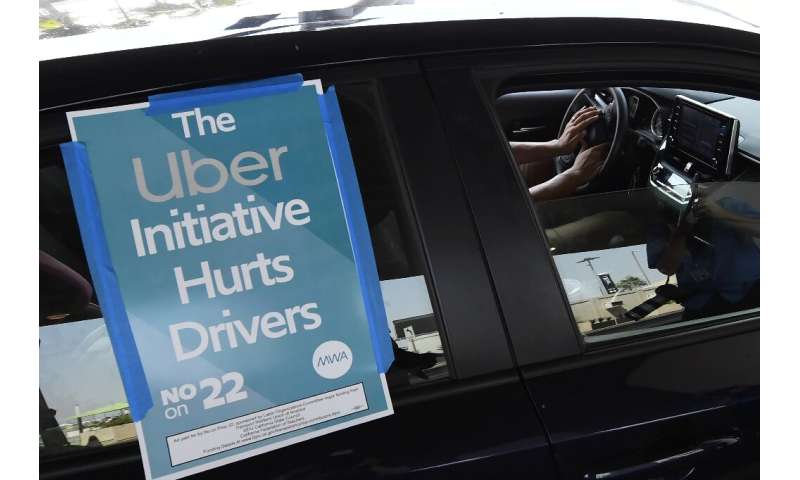#Gig economy lives on after California passes Uber-led referendum

“#Gig economy lives on after California passes Uber-led referendum”

The so-called “gig economy” survived a key test in Tuesday’s election as California voters approved a referendum backed by ride-hailing giants such as Uber which preserves the use of contractor-drivers and potentially opens the door to wider adoption of that model.
The initiative known as Proposition 22 backed by Uber, Lyft and other on-demand companies appeared headed for passage as the measure was backed by some 58 percent of state voters, according to incomplete results.
The measure effectively overturns a state law which would require the ride-hailing firms and others to reclassify their drivers and provide employee benefits.
The vote came after a contentious campaign with labor groups claiming the initiative would erode worker rights and benefits, and with backers arguing for a new, flexible economic model.
“With the passage of Prop 22, app-based rideshare and delivery drivers across the state will be able to maintain their independence, plus have access to historic new benefits, like a minimum earnings guarantee and health care,” said a statement from Yes on 22, a coalition of drivers, businesses and activist groups with funding from Uber, Lyft and delivery firm DoorDash.
It said the result represents a “massive win” for firms like Uber and Lyft, whose business model appeared threatened in their home state.
Daniel Ives of Wedbush Securities said the vote offers a clear approval of the gig economy model, noting that if it had failed “this would significantly impact the core DNA of the gig economy and ultimately the revenue model for Lyft and Uber.”
Ives added that a defeat for Proposition 22 might have encouraged other states for follow suit, potentially eroding the outlook for ride-hailing firms.
Uber and Lyft have pledged that if the measure passed, they would set aside funds for health and insurance benefits for their drivers, many of whom work part-time on a flexible schedule.
“The future of independent work is more secure because so many drivers like you spoke up and made your voice heard—and voters across the state listened,” Uber chief executive Dara Khosrowshahi said in an email to its drivers late Tuesday..
“We’re looking forward to bringing you these new benefits – like healthcare contributions and occupational accident insurance—as soon as possible.”

Broader implications
The proposition was also being looked at “nationally and globally” for what it might mean to the future of the labor movement, according to Sonoma University political science professor David McCuan.
“Prop 22 is a proxy for how we work; the future of work,” McCuan said.
“It’s about how gig workers use gig jobs as a bridge, not as a career. And it’s about the future of the labor movement in California.”
Erica Mighetto, an Uber driver who campaigned for the “no” vote along with labor organizations, expressed disappointment over the vote.
“We’re deeply saddened that Uber and Lyft have been able to confuse voters,” she said. “And this is really devastating and harmful to us.”
Uber and Lyft argued that many drivers sought the flexibility of being able to work when and where they choose to pick up extra income.
More than $200 million was spent promoting Proposition 22, while only a tenth of that amount was spent by labor groups opposing the measure.
Under the proposition, drivers remain independent contractors but Uber and Lyft are to pay them a number of benefits including a minimum wage, a contribution to healthcare and other forms of insurance. Critics of the measure said it failed to take into account the full costs borne by drivers.
Lyft driver Jan Krueger of Rancho Cordova supported the proposition, saying that it struck a balance between independence and job benefits.
“This vote in one of the most progressive states in the country should send a strong signal to elected leaders all over the nation,” Krueger said.
“Prop 22 should serve as a model for other states and the federal government to follow.”
Uber and Lyft claimed most drivers support the contractor model. But the firms were sued by the state which argued keeping that model violated California labor law. A Proposition 22 victory renders the court case effectively moot.
Supporters in the “Yes” camp had warned of mass job losses if the effort failed, as the companies could not afford to keep on all their drivers, and said others would quit because they would automatically have less flexibility.
Uber-backed gig worker initiative wins in California: US media
© 2020 AFP
Citation:
Gig economy lives on after California passes Uber-led referendum (2020, November 4)
retrieved 4 November 2020
from https://techxplore.com/news/2020-11-gig-economy-california-uber-led-referendum.html
This document is subject to copyright. Apart from any fair dealing for the purpose of private study or research, no
part may be reproduced without the written permission. The content is provided for information purposes only.
For forums sites go to Forum.BuradaBiliyorum.Com
If you want to read more Like this articles, you can visit our Science category.


